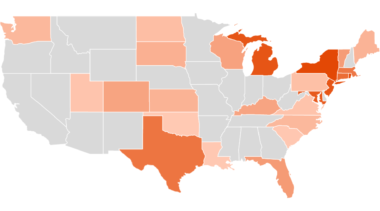Policy Briefs
View all policy studies.-
Streamline: How to Allocate Education Dollars Strategically
Education dollars should be allocated based on students’ needs using a weighted-student formula so that funding is fair, portable, and transparent.
-
A Student-Centered Funding Roadmap for Policymakers
Student-centered funding models treat every child more fairly, better recognize individuality, and allow for innovation and progress.
-
Planning For Potential Budget Cutbacks In Michigan: Sustainable School Finance Solutions
Even in a constrained fiscal environment, Michigan can improve education funding equity and better empower local school leaders.
-
10 Best Practices For State Automated Vehicle Policy
This policy brief offers 10 policy recommendations for state policymakers to promote automated vehicle innovation while protecting the public interest.
-
Reimagining Transportation Policy During and After COVID-19
The coronavirus pandemic is going to prompt changes to America’s transportation systems and policies.
-
Best Practices for Providing Education Funding for Economically Disadvantaged Students
This report examines federal education funding for student poverty and how state education finance systems can best fund students.
-
Vital PPE: How To Increase Production and Distribution of Masks to Fight COVID-19
Part six of a series discussing strategies for combating and recovering from the coronavirus pandemic. The important role PPE has in containing the coronavirus and returning to pre-COVID-19 economic activities.
-
Solving Florida’s Blue-Green Algae Bloom Crisis
Algal blooms and their associated health risks have the potential to hurt large segments of Florida’s economy and public well-being.
-
COVID-19 And Soaring Costs Are New Challenges for Texas High-Speed Rail Line
If Texas Central chooses to move ahead with this high-speed rail project, lawmakers and taxpayers should ensure it does not receive stimulus funding.
-
Monitor-Test-Trace-Isolate: Policies for Understanding and Reacting to COVID-19 Infections
Part five of a series discussing strategies for combating and recovering from the coronavirus pandemic. Technologies that enable contact tracing and sharing of verified COVID-19 status while preserving privacy and autonomy.
-
The COVID-19 Status App: A Risk-Based Tool to Enable Businesses to Reopen While Limiting the Spread of Sars-Cov-2
Part four of a series discussing strategies for combating and recovering from the coronavirus pandemic. The purpose of these tools is to enhance trust and improve information sharing.
-
Risk-Based Tools to Limit the Spread of Coronavirus: Information on Activity Risks and Industry Standards
Part three of a series discussing strategies for combating and recovering from the coronavirus pandemic. The decisions to implement these actions must be voluntary.
-
Preventing, Containing and Mitigating COVID-19: Lessons From Around the World
Part two of a series discussing strategies for combating and recovering from the coronavirus pandemic. Success almost everywhere started with the use of extensive strategic testing.
-
COVID-19 Lockdown Problems and Alternative Strategies to Safely Reopening the Economy
Part one of a series discussing strategies for combating and recovering from the coronavirus pandemic. More data-driven approaches based on test and trace are desirable.
-
Strategies for Combating and Recovering From the Coronavirus Pandemic
We identified approaches addressed in a series of policy briefs that, if taken together, form a coherent and effective strategy to combat the coronavirus pandemic.
-
Do Marijuana License Fees Help Keep the Black Market Going?
Marijuana fees are much higher than most alcohol license fees in each respective state.
-
Why Florida Should Shift from Gas Taxes to Per-Mile User Fees— and How to Do It
This policy brief focuses on how Florida policymakers can address the looming highway-funding problem by transitioning from per-gallon taxes to per-mile charges.
-
How Much Gas Tax Money States Divert Away From Roads
Examining the percentage of state gas tax revenue that is allocated for expenses unrelated to roads, including money shifted to law enforcement, education, tourism, environmental programs and more.

















